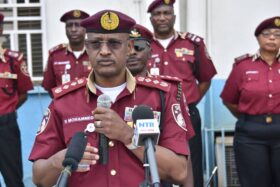President Bola Tinubu has approved nationwide night patrols and a major technological upgrade for the Federal Road Safety Corps (FRSC), according to Corps Marshal Malam Shehu Mohammed.
Speaking in Abuja during a commemorative interview with the News Agency of Nigeria (NAN) to mark Tinubu’s two years in office, Mohammed said the president’s Renewed Hope Agenda had significantly enhanced FRSC operations through increased funding, innovation, and support for proactive measures.
He said Tinubu’s directive for FRSC to resume full-scale night patrols was a direct response to the growing number of traffic accidents and fatalities occurring after dark.
“The government realised that most of the crashes, fatalities, and serious injuries occur at night. So, the president directed us to begin full night patrols,” Mohammed said.
The Corps Marshal noted that although reported crashes dropped by 10% in 2024, fatalities rose due to secondary incidents—particularly fuel scooping after tanker accidents.
“Primary crashes often do not kill, but secondary activities around fallen tankers do. That’s when the fatality increases,” he explained.
Mohammed praised the prompt action and support from the Office of the Secretary to the Government of the Federation (SGF), led by Sen. George Akume, for accelerating the corps’ administrative and operational needs.
“All our memos and activities pass through the SGF’s office, and he fast-tracks everything to support our road safety goals. We aim to reduce crashes by 50% by 2030, in line with global targets,” he said.
As part of recent advancements by the Federal Road Safety Corps (FRSC), Mohammed unveiled two key technological innovations introduced within the past year to enhance road safety and data management in Nigeria.
The first is a One-Stop Mobile App, designed to assist both drivers and passengers. The app issues alerts when vehicles exceed speed limits and provides real-time information about high-risk areas, including black spots, potholes, and dangerous bends. It also enhances emergency response efficiency by using geolocation technology to pinpoint accident sites and dispatch help more swiftly.
The second innovation is the National Crash Information Reporting System, a centralized database that integrates crash data from all security and emergency agencies across the country. This system was developed to address longstanding concerns from organizations like the World Bank and the World Health Organization regarding the reliability and fragmentation of Nigeria’s crash statistics.
“We now speak with one voice through a unified, credible database. This ends the duplication and improves data accuracy for national and global use,” Mohammed stated.
He added that staff training and office infrastructure had been upgraded across the corps to support these innovations and ensure improved public service delivery.
Mohammed emphasized that while the government had played its part, road safety remains a shared responsibility.
“We urge Nigerians to support these efforts. Avoid risky behaviour, especially around crash scenes. Road safety is a collective responsibility,” he said.
(NAN)


